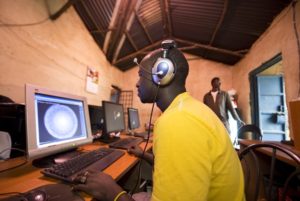By Ashley Okwuos
Earlier this year, Valery Colong Nyiwung lost $10,000 in just three months — almost 10 times the annual per capita income of Cameroon. And it wasn’t from playing the ponies. The only bet the tech entrepreneur made seemed to have winning odds: co-founding ActivSpaces, one of Cameroon’s leading technology hubs and an enterprise — naturally — that’s heavily reliant on reliable internet service. Nyiwung’s bad luck was to establish his company in a West African country where the government “requests” that telecommunications companies shut down the internet whenever it wants to stifle political dissent in certain parts of the country.

Good for repression, bad for business. And Nyiwung is far from alone in his predicament. According to the Brookings Institution, from July 2015 through June 2016, a total of nine internet shutdowns or network disruptions primarily for political reasons in seven African countries cost businesses there more than $400 million. That may not sound like much, but it’s an ominous trend on a continent where internet commerce is poised to contribute as much as $300 billion a year to the African GDP by 2025, according to a report from McKinsey & Company.
A 2015 report from Telegeography showed that international internet growth in Africa continues to outpace other parts of the world, but this growth can only continue when the government understands that “it has more to lose than to win by censoring the internet,” says Julie Owono, head of the Africa Desk at Internet Sans Frontières (Internet Without Borders). “A government cannot say that it wants to fully get into the digital economy and treat the essential commodity of that economy in the way we have seen so far,” says Owono.
The Republic of Congo government blocked access to Facebook, WhatsApp, Twitter and other platforms on the eve of the re-election of President Denis Sassou Nguesso, who has been in power for more than 30 years, citing “security and national safety of its citizens” as the reason. As a result, the business community there lost more than $72 million in 15 days. In 2016, Uganda’s five days of social media disruption ordered by the Electoral Commission for security reasons cost more than $2 million during voting and the inauguration of five-term president Yoweri Museveni.
Politically motivated shutdowns also have taken place in Gambia, Ethiopia, Chad, Gabon and Burundi. In 2016, Algerian businesses were collateral damage to the tune of more than $20 million when the government disrupted social media for six days as a way to stop students from cheating on exams, according to a report from the Brookings Institution.
Read more: THE BATTLE FOR A FREE INTERNET IN AFRICA
Source: ozy.com

Leave a Reply